UCP and NDP tied as the provincial election is set to kick off
April 26, 2023
As the start of the Alberta provincial election approaches, Abacus Data conducted a comprehensive province-wide survey of 1,000 eligible voters from April 21 to 25 to understand the dynamics of public opinion in the province and to track questions previously asked in our surveys. Note that this survey was conducted prior to the Calgary event center announcement yesterday.
This is the first in a series of releases on public opinion in Alberta. It explores vote intention and the motivators of vote choice in the province.
Here’s what we found:
The Election is Deadlocked
Among all eligible voters, the UCP and the NDP are tied at 36%. 22% are undecided, while 4% say they are voting for the Alberta Party and 3% for another party.

The NDP and UCP are each up one from our last poll in March, while the share of undecideds hasn’t changed.

Among eligible voters likely to vote, the NDP and UCP are statistically tied, with the NDP numerically ahead by 1. The NDP is at 43%, the UCP at 42%, and the Alberta Party at 4%. 9% of likely voters are undecided.
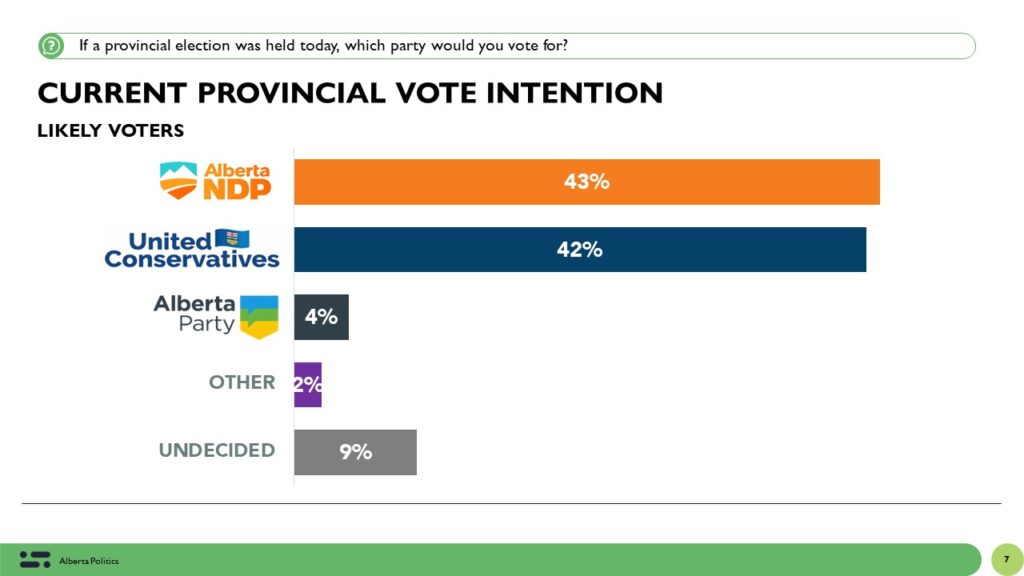
When we remove the undecided, the ballot among all decided voters is 46% for the UCP and 46% for the NDP. Among decided likely voters, it is 47% for the NDP and 46% for the UCP.

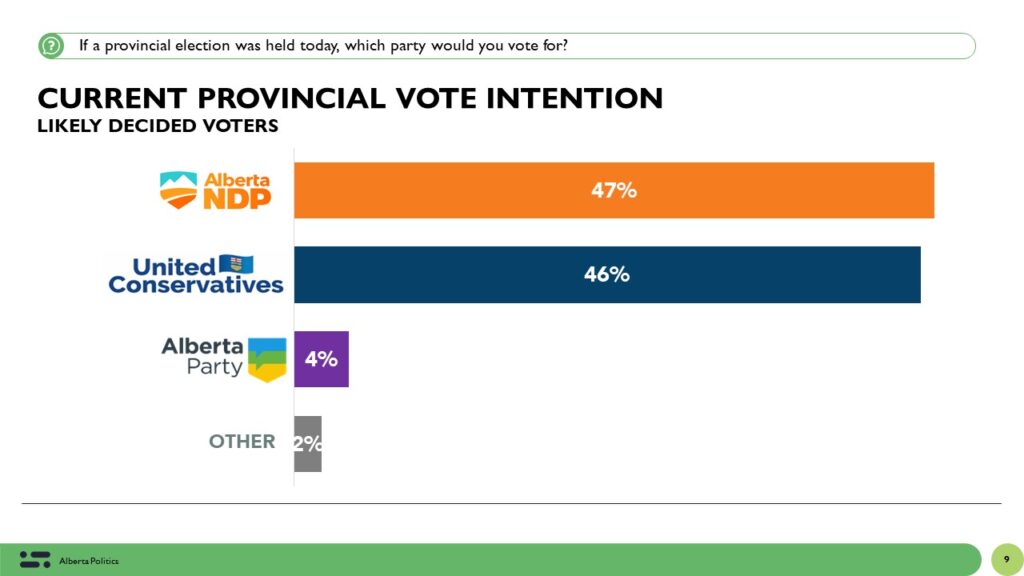
The UCP is slightly ahead in Calgary
In this survey, we oversampled in Calgary (n=478) and adjusted the sample for the province-wide estimates.
The NDP leads by almost 30 points in Edmonton (NDP 53%, UCP 24%, Undecided 15%), while the UCP leads by almost 20 outside of Calgary and Edmonton (UCP 42%, NDP 25%, Undecided 29%).
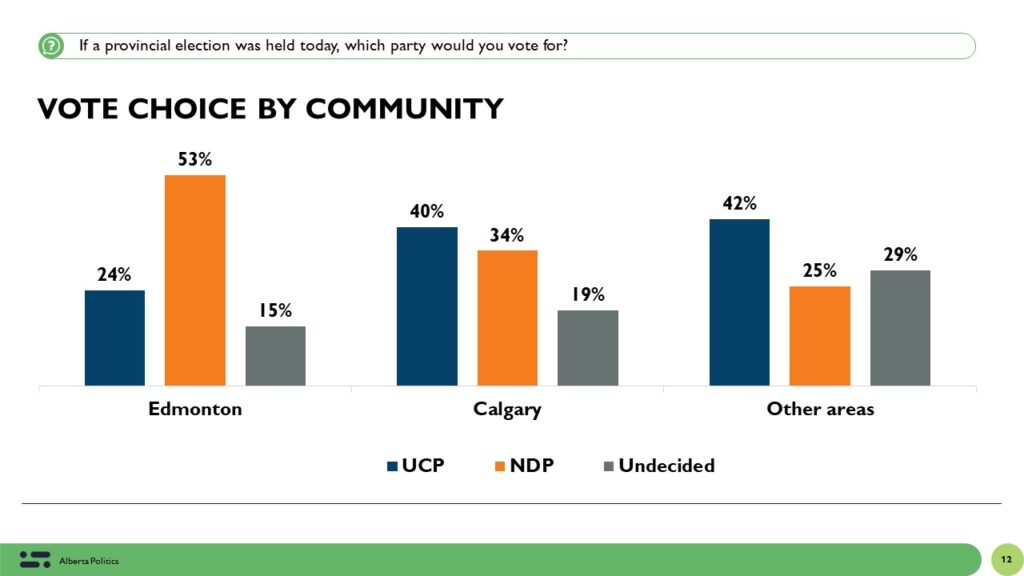
In Calgary, the UCP has a 6-point lead over the NDP (40% to 34%) with 19% saying they are undecided.
When undecideds are removed, the results in those regions are:
Calgary: UCP 49%, NDP 42%, AP 7%
Edmonton: NDP 63%, UCP 28%, AP 3%
Other communities: UCP 59%, NDP 35%, AP 4%
These estimates don’t change much when we isolate only those most likely to vote:
Calgary: UCP 48%, NDP 43%, AP 7%
Edmonton: NDP 62%, UCP 33%, AP 3%
Other communities: UCP 56%, NDP 39%, AP 4%
UCP leads among older Albertans and men. NDP is ahead among younger and women.
The UCP has a 9 point lead among eligible voters 45 and over and a 6 point lead among men (40% to 34%), while the NDP leads by 10 points among those under 45 and leads by 6 among women.
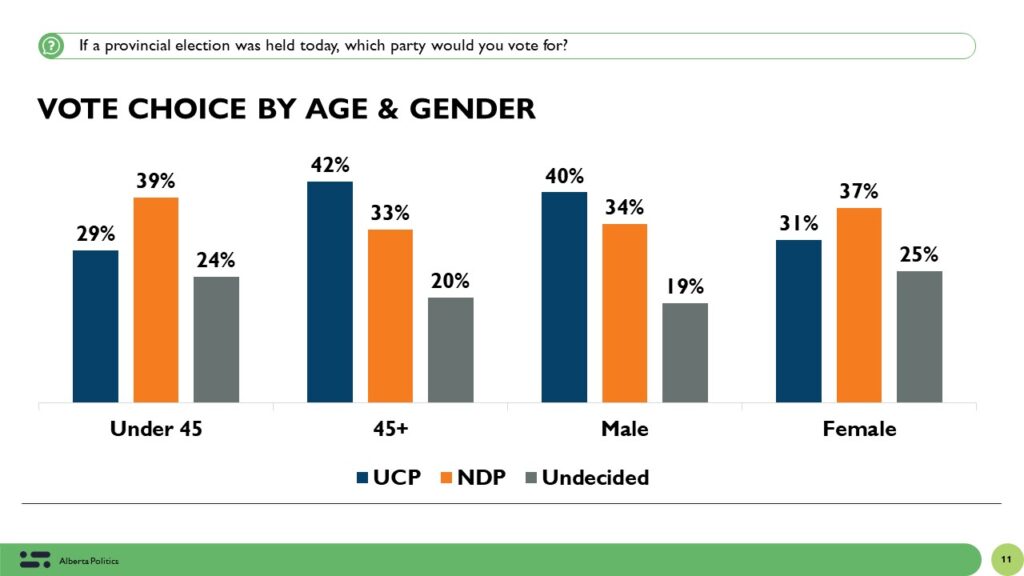
The UCP is ahead among those who have obtained a high school degree and those with a college degree. The NDP leads by 14 points among those with a university degree.
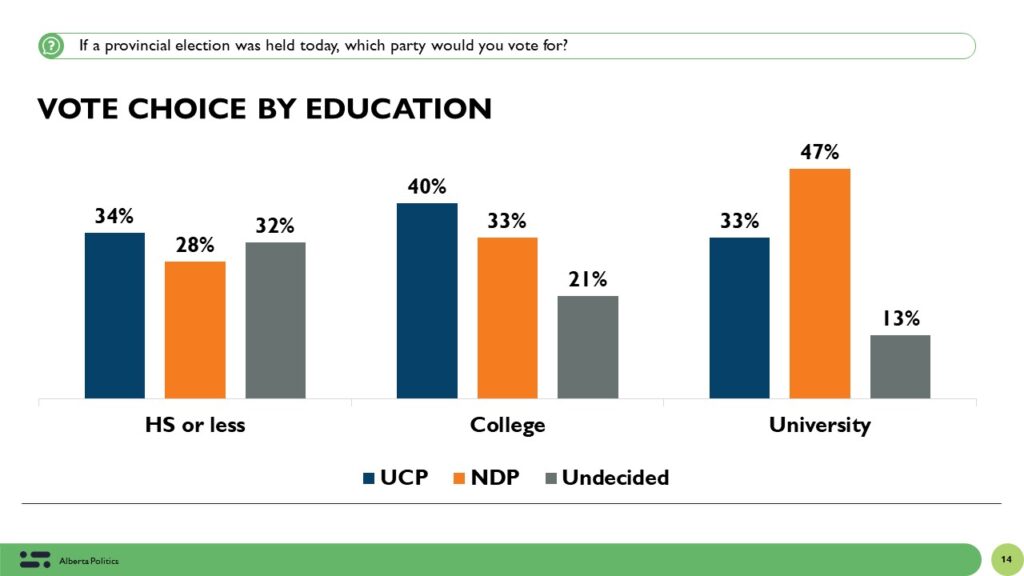
17% of our sample say they are currently members of a union. Among this group, the NDP leads the UCP by 9 points.
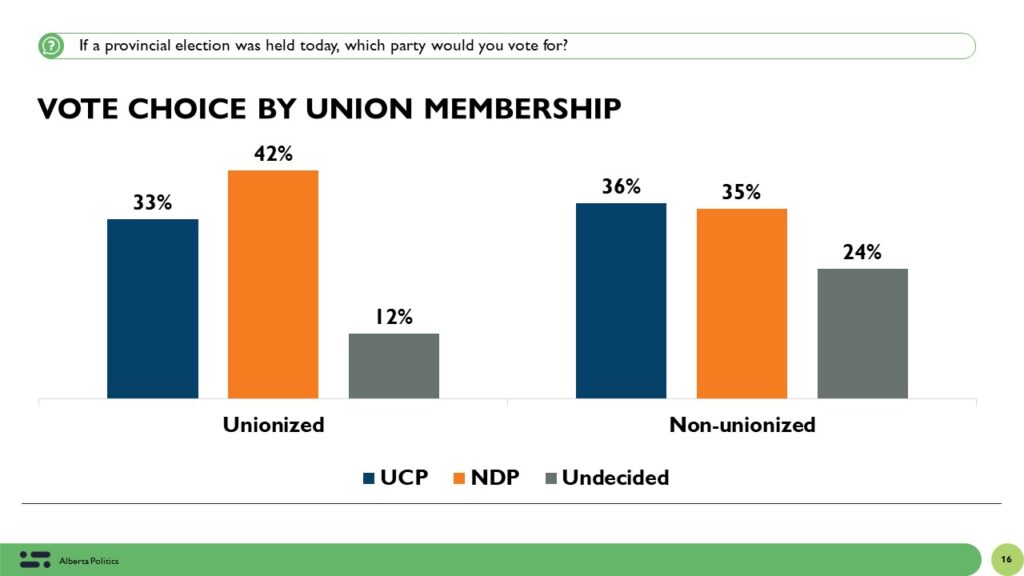
NDP has a big, 26-point lead among those who self-identify as a member of a racialized community. 50% would vote NDP, 24% UCP, and 17% are undecided. Among those who don’t self-identify as a member of a racialized group, the UCP leads by 9 (40% to 31% with 24% undecided).
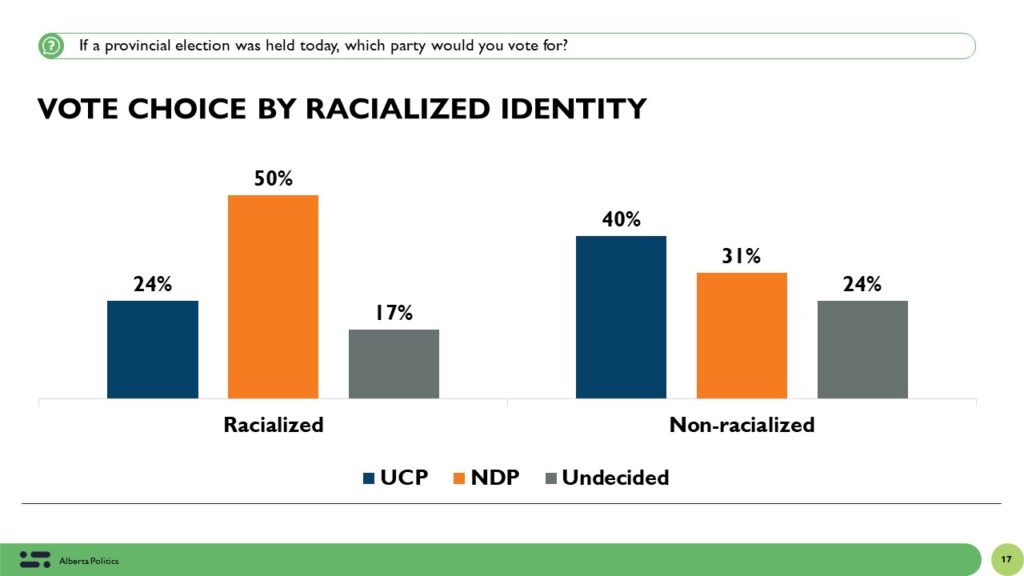
Past UCP voters remain the most undecided at this point.
We continue to track how past UCP voters say they are going to vote. Today, 60% of those who say they voted UCP in 2019 will vote for the party again. This is down slightly from March. 13% say they will vote NDP, while 20% are undecided.
Among past NDP supporters, 87% will vote NDP again, 6% are backing the UCP, and 3% are undecided.
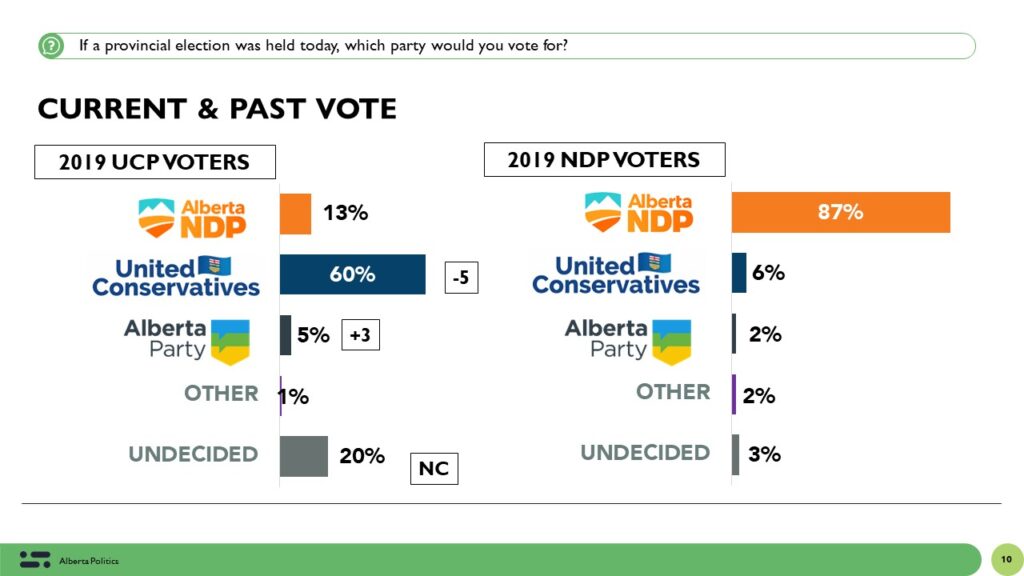
When we look at the relationship between past federal vote and current vote intentions, we find that past federal Liberal and NDP voters overwhelmingly support the Alberta NDP. Among past federal Conservative supporters, 63% are voting UCP, 12% NDP, and 21% are undecided.
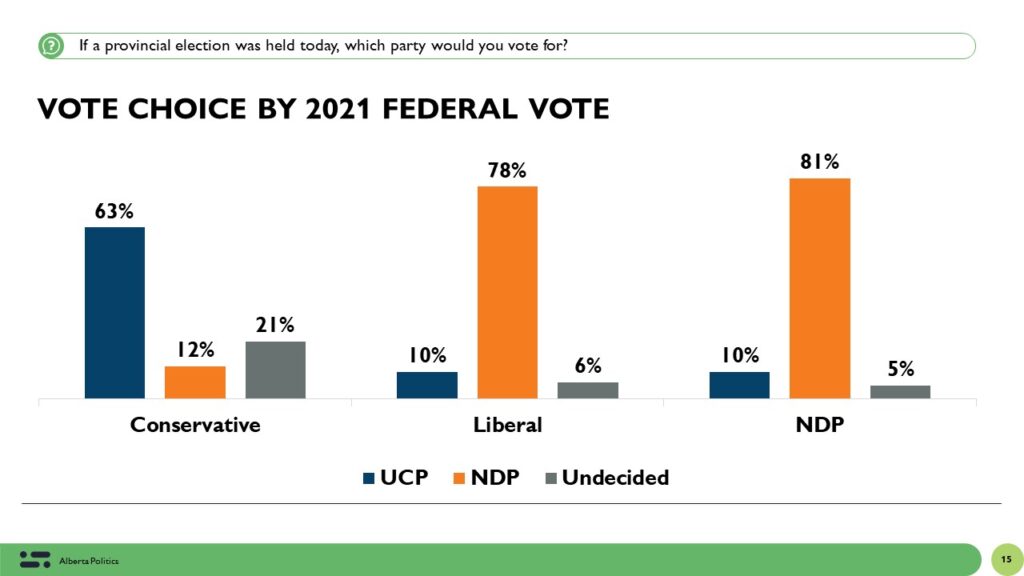
Reluctant UCPers make up 18% of the electorate.
In the past, we have categorized voters based on their current and past vote choice and estimated the size of each segment in the electorate. We noted the importance of one group in particular – the “Reluctant UCPers”. This group voted for the UCP in 2019 but is undecided or would vote for another party today. What they decide to do in this election will likely determine the outcome, given how close the election is.
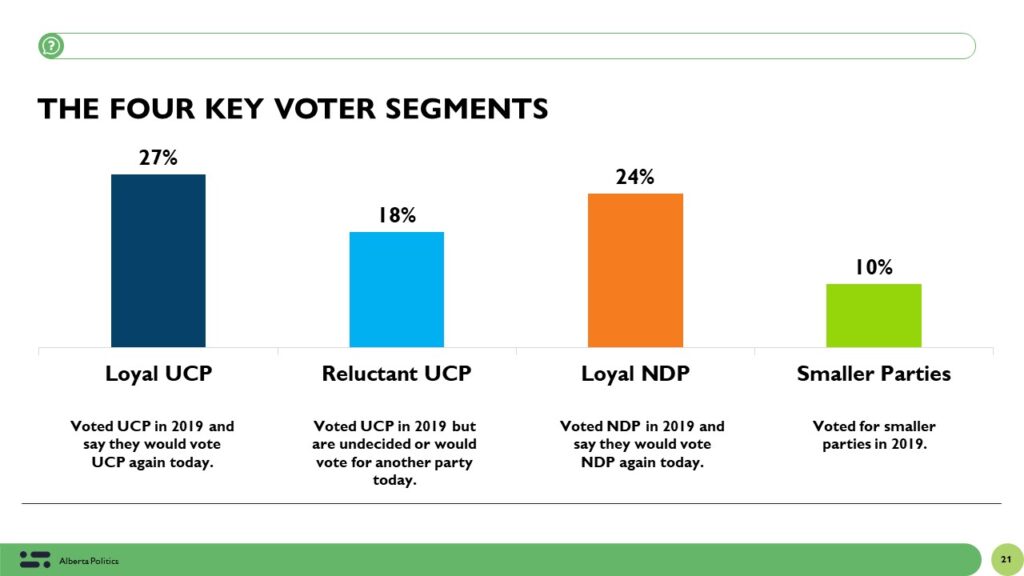
Today, 34% of Reluctant UCPers would vote NDP, 15% would vote for another party, and 51% say they are undecided.
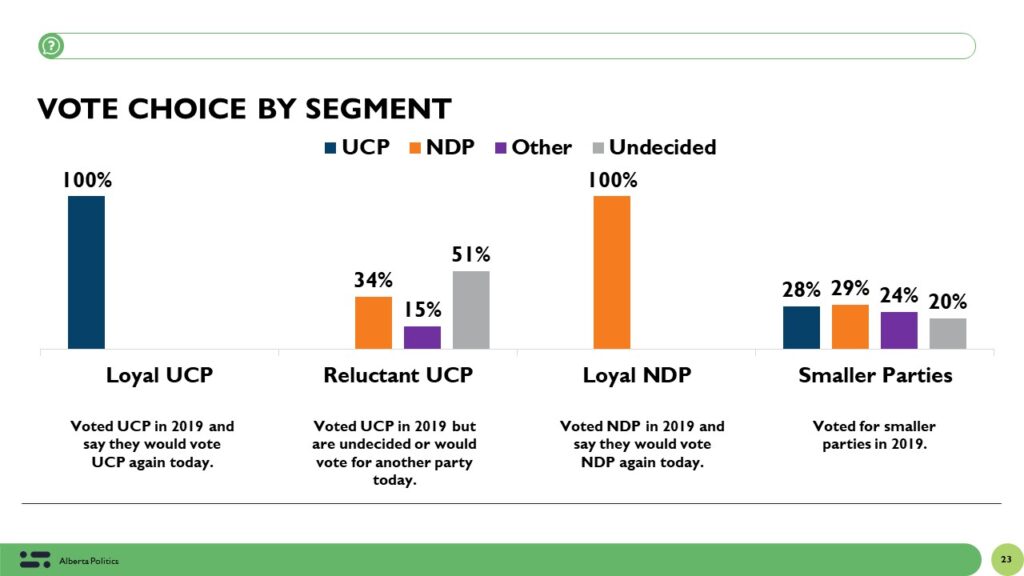
However, more importantly, they say they are less likely to vote than either the Loyal UCP or Loyal NDP groups. 69% say they are likely to vote compared with 89% and 84% of those in the loyal groups.
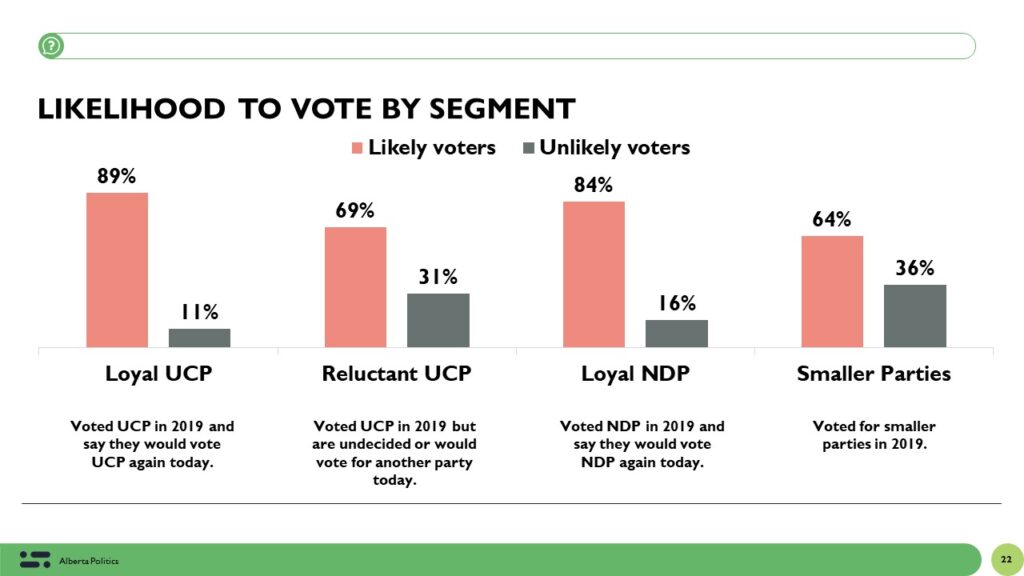
Here are a few other insights about the Reluctant UCPers:
- They are split almost evenly between men and women.
- More live outside of Calgary or Edmonton than the rest of the population.
- 70% voted for the federal Conservatives in 2021 and 100% voted UCP in 2019.
- 59% would rather Rachel Notley be premier after the election, while 41% prefer Danielle Smith.
- 51% feel Danielle Smith has been worse as premier than Jason Kenney. 15% feel she’s been a better premier.
- Among those who are undecided in this group, 20% are leaning toward the UCP, 4% to the NDP, and 71% say they are completely undecided.
- 63% believe the election is going to be close, 5% think the UCP will win easily, and 10% think the NDP will win easily.
- The top 3 issues for this group are the cost of living, healthcare, and managing the economy.
What’s motivating the vote?
In this survey, we asked those who said they planned to vote UCP or NDP why they are voting for those parties. Of note, 1 in 3 Albertans are voting for a party to stop another party from forming the government and almost half (44%) of those voting NDP or UCP are doing so to stop the other party from winning.
Of UCP voters, 41% are voting UCP because they don’t want Rachel Notley or the NDP to be in power. Another 37% said it’s because they like Danielle Smith while 20% said it’s because they always vote UCP.
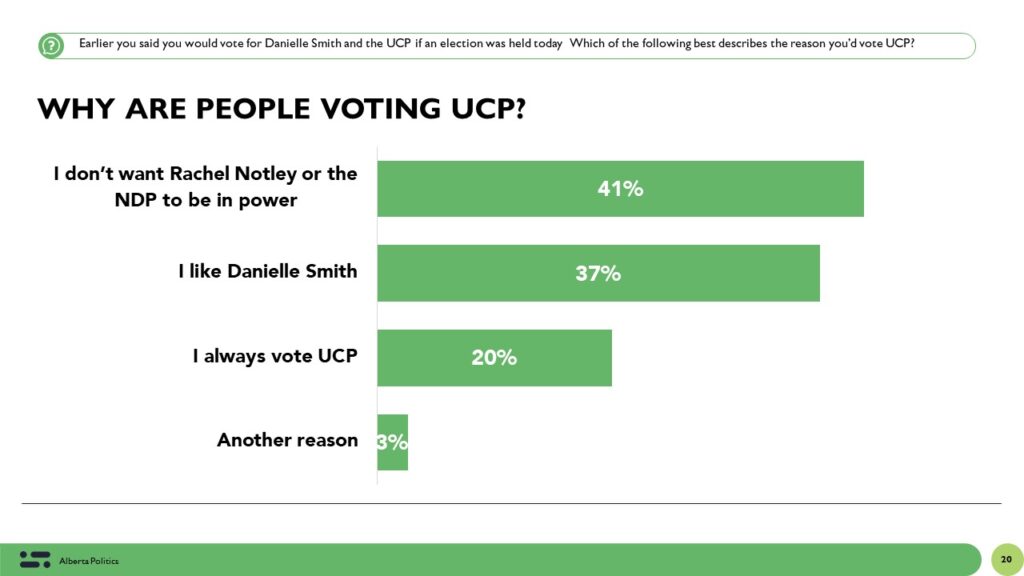
For NDP voters, stopping Danielle Smith and the UCP from winning is a motivator for almost half. Another 32% say they are voting NDP because they like Rachel Notley while 12% say it’s because they always vote NDP.
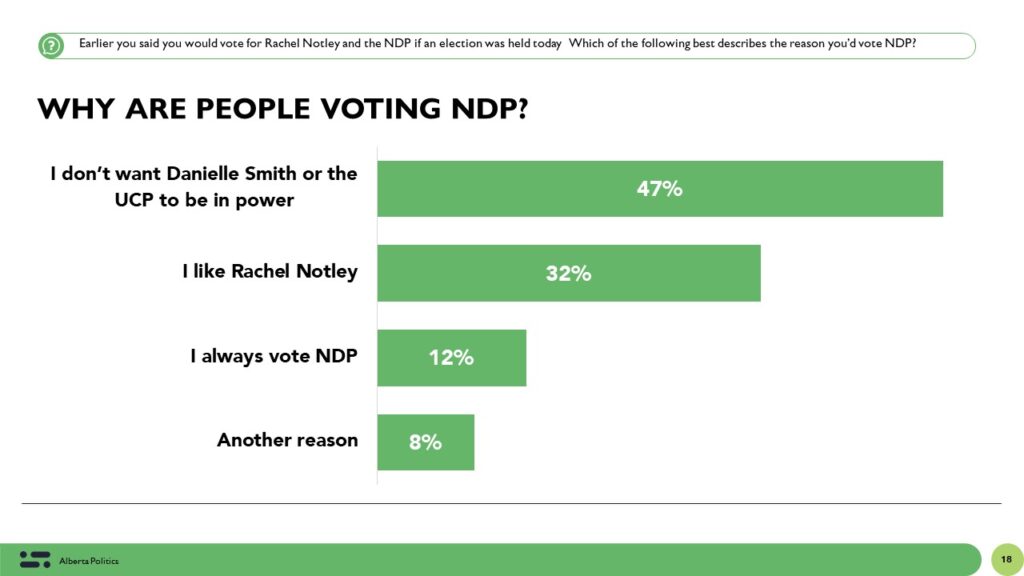
Interestingly, among Reluctant UCPers who are planning to vote NDP, 65% say it’s because they are repelled by Danielle Smith and the UCP than attracted to the NDP.
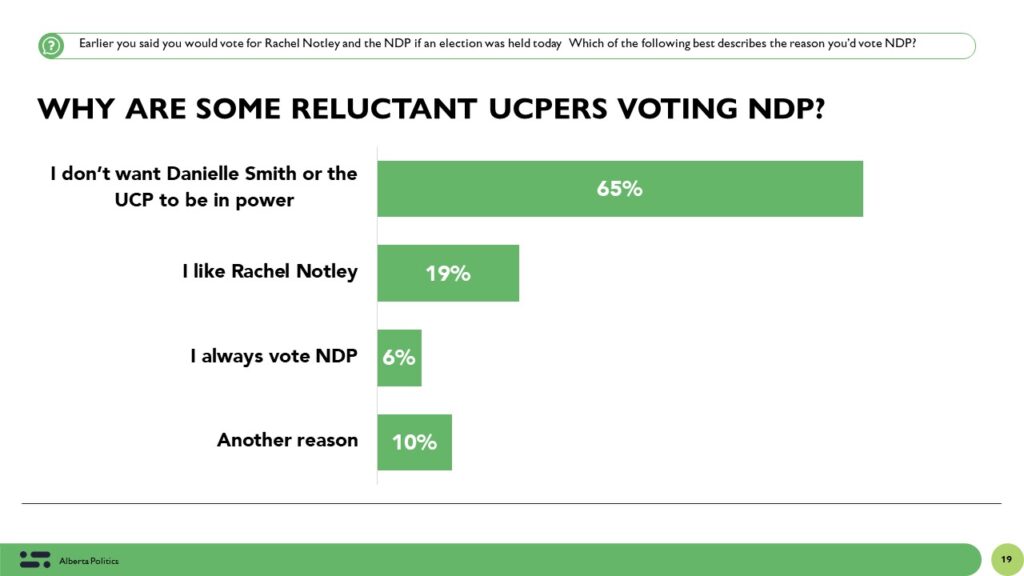
THE UPSHOT
As the Alberta election is set to kick off, the race is as close as it could be. The UCP and NDP are deadlocked among both the wider electorate and those most likely to vote. Perhaps most important in determining the outcome, the UCP has a slight lead over the NDP in Calgary. Over the next few days, I’ll release more data to help explain why we are seeing such a divided electorate.
Public opinion is highly polarized and unlikely, in my view, to change much over the election. The impressions of the leaders and the parties are well-developed. The issue set hasn’t changed much, and only a last-minute issue like a new event center in Calgary could reshape the choice voters are being asked to make.
What will matter in an election this close is turnout. It appears both the UCP and NDP bases are energized, with almost all saying they are likely to vote. That means all eyes will be on what the Reluctant UCPers and those who voted for smaller parties
METHODOLOGY
The survey was conducted with 1,000 Alberta adults eligible to vote from April 21 to 25, 2023.
A random sample of panelists were invited to complete the survey from a set of partner panels based on the Lucid exchange platform. These partners are typically double opt-in survey panels, blended to manage out potential skews in the data from a single source.
The margin of error for a comparable probability-based random sample of the same size is +/- 3.1%, 19 times out of 20.
The data were weighted according to census data to ensure that the sample matched Alberta’s population according to age, gender, educational attainment, and region. Totals may not add up to 100 due to rounding.
This survey was paid for by Abacus Data Inc.
Abacus Data follows the CRIC Public Opinion Research Standards and Disclosure Requirements that can be found here: https://canadianresearchinsightscouncil.ca/standards/
ABOUT DAVID COLETTO
David Coletto is Chair, CEO and a founding partner of Abacus Data a full-service market research and strategy firm based in Ottawa and Toronto. With over a decade and a half of experience in the industry, David and his partners founded Abacus 12 years ago and since then David has become one of Canada’s most respected social researchers regularly commenting on politics, the labour market, and consumer behaviour.
He earned a PhD in Political Science from the University of Calgary in 2010 and is an adjunct professor at Carleton University. He is the host and producer of inFocus with David Coletto a podcast that explores the intersection of public opinion, politics, public policy, and consumer behaviour.
ABOUT ABACUS DATA
We are the only research and strategy firm that helps organizations respond to the disruptive risks and opportunities in a world where demographics and technology are changing more quickly than ever.
We are an innovative, fast-growing public opinion and marketing research consultancy. We use the latest technology, sound science, and deep experience to generate top-flight research-based advice to our clients. We offer global research capacity with a strong focus on customer service, attention to detail, and exceptional value.
We were one of the most accurate pollsters conducting research during the 2021 Canadian election following up on our outstanding record in 2019.
Contact us with any questions.
Find out more about how we can help your organization by downloading our corporate profile and service offering.



